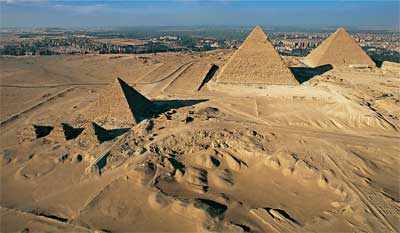|
FOR IMMEDIATE RELEASE
1/20/2007: GIZA ARCHIVES PROJECT "GOES INTERNATIONAL"
From June 24 to July 11, 2006, Giza Archives Project Director Peter Der Manuelian traveled through Europe to meet with museum, university and institute representatives from the major Giza collections and archives. Each institution had previously expressed a general interest in collaborating on Giza, and a survey questionnaire was sent out from Boston prior to the trip. The visits resulted in the desire to share Giza materials, thereby turning the Giza website (www.mfa.org/giza; www.gizapyramids.org) into a central repository for all the major excavations of the twentieth century.
None of the institutions possesses the overwhelming documentation for Giza that is found at the Museum of Fine Arts in Boston. Nevertheless, there are critical groups of images, diaries, notes and, of course, collections of ancient objects from Giza.
Below is the list of institutions involved. The Giza Archives Project staff extend their gratitude to the directors, curators, and staffs of all the institutions for their hard work and collaboration in helping to created "Giza International" online.
| Partner Institutions for "Giza International" |
| EGYPT |
| Cairo: Egyptian Museum |
| ITALY |
| Turin: Museo Egizio |
| AUSTRIA |
| Vienna: Kunsthistorisches Museum |
| Vienna: Ägyptologisches Institut der Universität Wien |
| GERMANY |
| Berlin: Berlin-Brandenburgische Akademie der Wissenschaften |
| Berlin: Ägyptisches Museum |
| Leipzig: Ägyptisches Museum, Universität |
| Hildesheim: Pelizaeus-Museum |
| USA |
| Berkeley, CA: Hearst Museum of Anthropology |
| Boston: Museum of Fine Arts |
| Philadelphia: University of Pennsylvania Museum of Archaeology and Anthropology |
First strategies will consist of scanning materials in the home institutions and sending their digirtal surrogates to Boston for processing and incorporation in the Giza databases. Eventually, Gallery Systems's "distributed search" tool might eventually allow these Giza materials to remain in their home institutions' online systems, but be searched nonetheless via the Giza online interface. The obvious advantage here would be dynamic data enhancements maintained by the host institutions, entered by their own personnel who know their own collections best.
|
